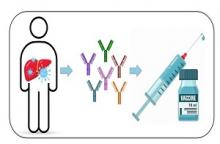- About us
- Research
- Students & Teaching
- Seminars & Events
- Directories
- Booking Rooms & Equipment
- עברית
Home » Dr. Tzarum - development of a vaccine against hepatitis C virus
In the past few months, during the COVID-19 pandemic outbreak, we have all experienced how viruses can disrupt and paralyze our normal daily life.
SARA-CoV-2, the virus responsible for the recent outbreak, is part of RNA-viruses, which includes other known viruses such as influenza virus (flu), human immunodeficiency virus (HIV), Zika virus, and Ebola virus. Viruses from this group are characterized by high genetic diversity, resulted from a high rate of mutations in the RNA replication process. Consequently, the viral envelope proteins are rapidly changing, which prevents the adaptive immune system from eliciting an effective immune response with a robust immunological memory response. For this reason, our ability to develop an effective vaccine against RNA-viruses is more challenging.
One of the main focuses in RNA-viruses research is understanding the interactions between the virus and the immune system, how RNA-viruses evade our adaptive immune system, and on the other hand, how our immune system fights them and, in some cases, can neutralize the virus. Such understanding can mediate the development of a prophylactic vaccine to elicit a more effective immune response with strong immunological memory.
In recent years, my research has been focused on another virus that belongs to the RNA viruses - hepatitis C virus (HCV), a main cause of liver cirrhosis and hepatocellular carcinoma. HCV infects about 1% of the world's population and causes ~500,000 deaths annually (for comparison, up to now SARS- CoV-2 causes about 300,000 deaths). In the past decade, direct-acting antivirals drugs have been used in the clinic to treat HCV patients. However, this treatment faces several challenges, such as late-step diagnostics, high cost of treatment, and drug resistance. In parallel, the rise of a new HCV-infected generation, a direct consequence of the current opioid epidemic, underscores the critical need for the developing of an effective vaccine against HCV.
My research focused on understanding how our adaptive immune system recognizes HCV, and in ~30% of cases, even neutralizes the virus and cures the patient.
For this aim, we isolated from infected patients or animal immunization experiments, neutralizing antibodies (nAb). Using structural and biochemical methods (e.g., binding and neutralization assays, X-ray crystallography), we characterized the interactions between the nAb and the E2 envelope protein and characterized the regions that the nAbs bind. These regions, called neutralization epitopes, are highly conserved among HCV strains and are also very important for the functionality of the virus and, therefore, can aid in the development of an effective vaccine.
Next, we utilized this knowledge to design the E2 protein to stabilize it so the neutralization epitopes will be more exposed to the immune system and thus capable of eliciting a better immune response. In the first stage, we removed regions that shield the neutralization epitopes and help the virus to escape the immune system, as well as regions in the E2 protein that cause a non-effective immune response (non-neutralization epitopes).
Next, we fused the designed protein to self-assembly nanoparticles, to mimics better the shape and size of the virus. Utilizing biophysical, biochemical, and structural methods, we have shown that the designed protein is more stable and serves as a better antigen. Also, vaccine experiments in mice have shown that the vaccine we have developed can produce a better immune response compared to the wild-type protein. This study has extended our understanding of how the immune system recognizes and neutralizes HCV, and is an essential milestone in the effort to develop an effective HCV vaccine.
During the last summer, I joined the Institute of Life Sciences. In our lab, we are investigating the interactions between HCV virus and the host cell - how the virus binds specific receptors on the host cell and how these interactions cause the entry of the virus to the host cells.
In parallel, we are continuing to investigate the immune response against HVC to promote further vaccine development. To that end, we have recently performed immunization experiments in alpaca to isolate unique antibodies called Heavy chain Abs against HCV. Heavy chain Abs can recognize smaller epitopes than normal antibodies, and therefore they can help identify new neutralization epitopes that are not accessible to regular Abs. This knowledge can promote the development of a more efficient vaccine. Also, Heavy chain Abs can be used for the development of drugs that inhibit the entry of the virus into the host cell.
These research methods are the front line in the development of vaccines and inhibitors against RNA viruses and will also greatly assist in the development of a vaccine against SARS-CoV-2.
Contact - Netanel.Tzarum@mail.huji.ac.il
